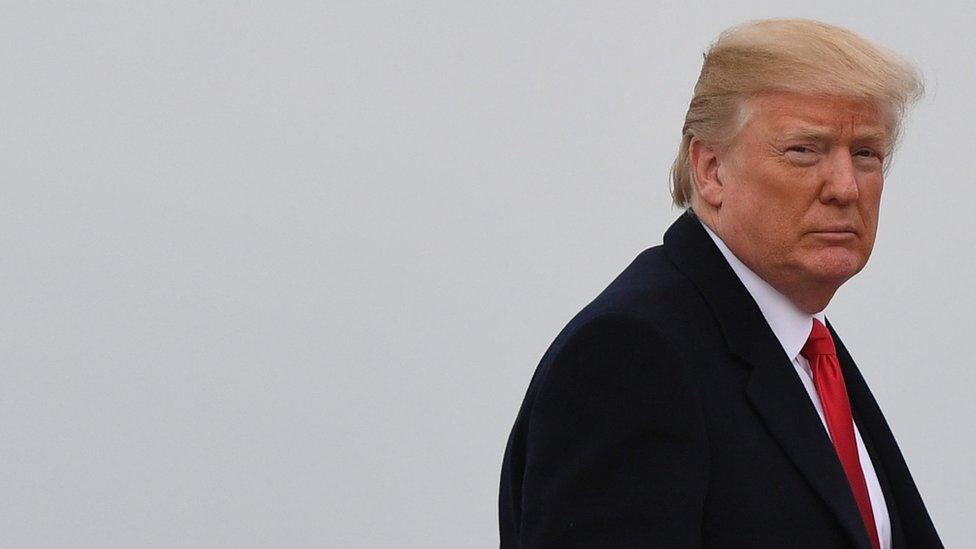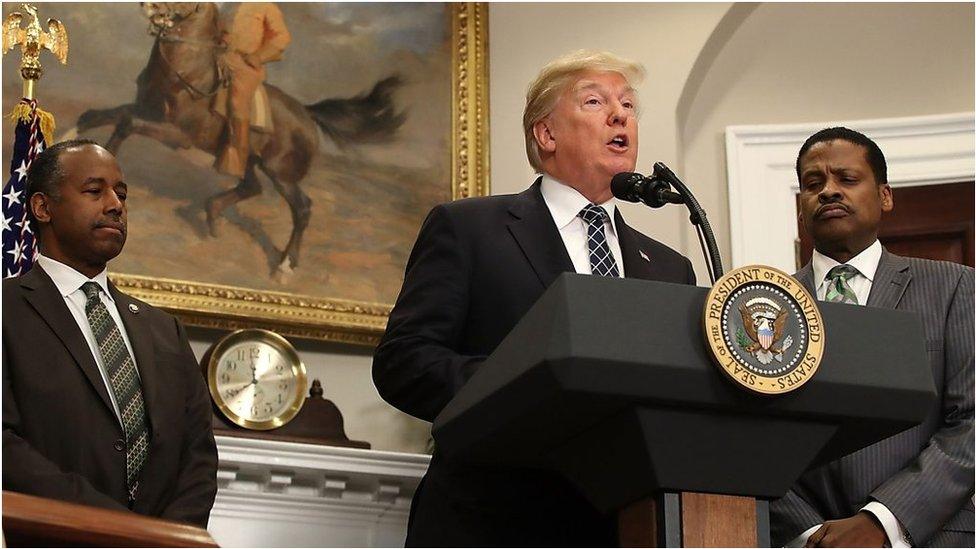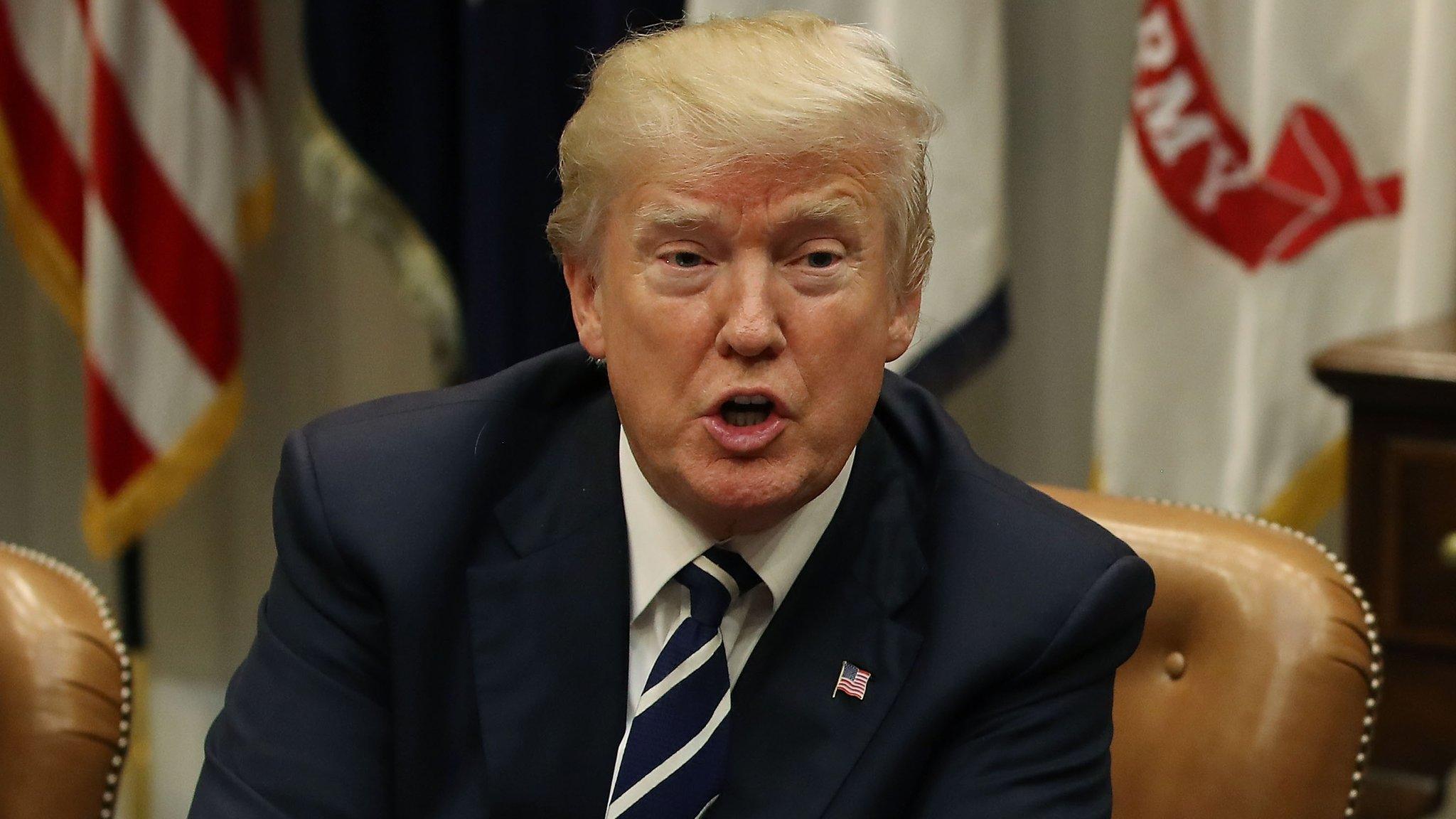Donald Trump denies being a racist after reported crude remark
- Published
The president made the comments to White House reporters at his Florida golf resort on Sunday
President Donald Trump has denied that he is racist, after a row broke out over his alleged use of the word "shithole" to describe African nations.
Mr Trump reportedly used the term last week during a bipartisan Oval Office meeting on immigration reform.
He has now told reporters: "I am not a racist. I'm the least racist person you have ever interviewed."
It is the first time the president has responded directly to the racism accusations.
He made the denial to White House press pool reporters at the Trump International Golf Club in West Palm Beach in Florida on Sunday night.
What did the president allegedly say?
The row broke out after lawmakers from both parties visited the president on Thursday to work on a proposal for a bipartisan immigration deal.
In recent weeks the Trump administration has been withdrawing Temporary Protected Status (TPS) from a number of nationalities currently living in the country.
Reports later emerged in US media that Mr Trump had asked during the meeting: "Why are we having all these people from shithole countries come here?"
Mr Trump was said to have told them that instead of granting temporary residency to citizens of countries hit by natural disasters, war or epidemics, the US should be taking in migrants from countries like Norway.
President Trump honours MLK amid 'racist slur' controversy
Accounts suggest that when Mr Trump was told that the largest groups of immigrants with the status were from El Salvador, Honduras and Haiti, the president responded: "Haitians? Do we need more Haitians?"
Who backed up the claims?
The president tweeted on Friday morning that the language he used in the meeting was "tough" but disputed the wording of the reports.
Allow X content?
This article contains content provided by X. We ask for your permission before anything is loaded, as they may be using cookies and other technologies. You may want to read X’s cookie policy, external and privacy policy, external before accepting. To view this content choose ‘accept and continue’.
He also posted another tweet denying he had insulted Haitians, accusing Democrats of making it up.
But Senator Dick Durbin stood by claims, and said that Mr Trump had used "hate-filled, vile and racist" language during the meeting.
Dick Durbin: "Trump said these hate-filled things, and he said them repeatedly"
Several senior Republican lawmakers at the meeting appeared on the Sunday shows to back up Mr Trump.
Senator David Perdue said the reported slur was a "gross misrepresentation". On Friday, in the immediate aftermath, he had said he could not recall the conversation.
But another Republican senator who was there, Lindsey Graham, did not deny the comments were made.
"Following comments by the president, I said my piece directly to him yesterday. The president and all those attending the meeting know what I said and how I feel," he said.
House Speaker Paul Ryan, a senior Republican, said that Donald Trump's immigration comments were "very unfortunate" and "unhelpful".
Asked on Sunday on whether he thought the comments had made it harder to achieve any immigration deal, Mr Trump responded: "Have you seen what various senators said about my comments? They weren't made."
The missing - consequences of Trump's immigration crackdown
What has the reaction been?
The African Union on Friday demanded that the US president apologise expressing their "shock, dismay and outrage" at the "clearly racist" remarks.
The UN human rights spokesman, Rupert Colville, told a Geneva news briefing: "There is no other word one can use but racist. You cannot dismiss entire countries and continents as 'shitholes'."
South Africa's foreign office has summoned the deputy chief of mission at the US embassy to protest over the reported comments, although Ghana has denied media reports that it has done likewise.
The National Association for the Advancement of Colored People (NAACP) accused the president of falling "deeper and deeper into the rabbit hole of racism and xenophobia".
Several Democratic representatives have said they intend to skip the president's State of the Union address later this month over the comments, accusing the president of racism.
What the world thinks of Trump

More on Trump's first year
- Published12 January 2018

- Published12 January 2018

- Published12 January 2018
